Search
Showing 10 of 1867 results for how to register international groups
-
US roadshow sparks interest in New Zealand universities
Education New Zealand Manapou ki te Ao (ENZ), together with Victoria University of Wellington, Lincoln University, the University of Auckland, and the University of Otago recently completed a successful tour of high schools across Hawaii. The aim? To inspire local students to think of New Zealand not just as a beautiful place to visit, but as a world-class place to study.
Across a week-long series of classroom presentations, university fairs, and dedicated sessions for school counsellors, the New Zealand delegation engaged directly with more than 300 students and families and connected with 25 high school counsellors.
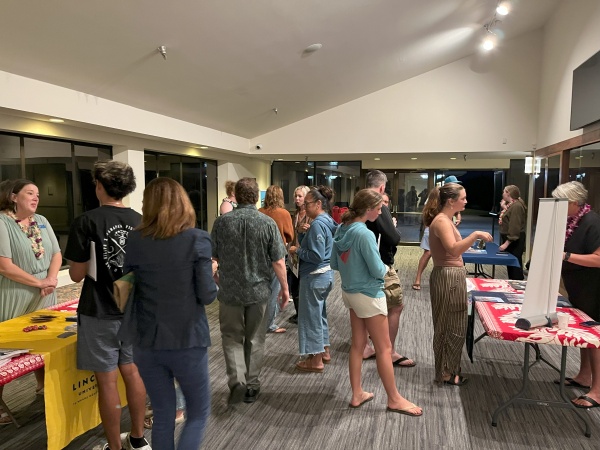
Representatives from New Zealand universities talking to students and their parents about their study offering.
Director of College Counseling at Le Jardin Academy, Scott Liedtke, said face-to-face conversations are powerful.
“When New Zealand educators come to Hawaii, it helps demystify studying overseas. Students and families can ask questions directly about cost, safety and credit transfer, and hear answers from the source,” he said.
ENZ also partnered with the New Zealand Consulate in Hawaii to host two events for local school counsellors. A breakfast at the New Zealand Chancery and a brunch at the Consul General’s residence allowed for deeper discussions and relationship-building within the education community.
Dan Cairns, Administration Manager at the New Zealand Consulate, described the events as more than just informational.
“Each gathering was designed to reflect different kaupapa, from celebrating international education to acknowledging our shared Polynesian connections – these moments created space to build people-to-people ties that go far beyond the classroom,” he said.
The impact of the roadshow was immediate. Each of the attending universities reported that at least two students had begun applications to study in New Zealand.
Director of Engagement, North America, DuBois Jennings said for ENZ, the roadshow represents a step towards long-term engagement in a region with shared cultural values.
“The clear appetite for New Zealand study options, shows there is real value in continuing and expanding this mahi,” he said.
Scott Liedtke echoed that sentiment. “New Zealand feels like a home away from home for many of our students. With its island lifestyle, cultural familiarity, and globally recognised education, it’s a natural fit,” he said.
“Here in Hawaii, we say the ‘coconut wireless’ — word of mouth — is strong. Once a few students head to New Zealand and love it, that news spreads fast,” Scott added.
For New Zealand study providers looking to find out more about the Hawaiian market, you can contact DuBois Jennings directly via email: dubois.jennings@enz.govt.nz
-
Growing visibility of New Zealand education in Latin America
From 12 -21 March, Education New Zealand Manapou ki te Ao (ENZ) held its first in-market, in-person roadshow in Latin America since before the Covid-19 pandemic. A total of 18 New Zealand education providers took part in the activities held in Colombia (Bogotá), Brazil (São Paulo), and Chile (Santiago), which brought together 143 representatives from 97 education agencies.
Representatives from institutions across New Zealand’s education sector (universities, English language schools, PTEs, and secondary schools) had the opportunity to network with agents and recruit students directly, strengthening connections with strategic partners and raising the profile of New Zealand in Colombia, Brazil, and Chile.
ENZ’s Director of Engagement for Latin America, Javiera Visedo, and Brazil Market Development Manager, Bruna de Natale, led the activities in all three countries. They provided full support to the New Zealand delegation, offering strategic information to maximise the professionals' time with Latin American partners, as well as sharing insights about the New Zealand institutions with local agents.
Through institutional presentations, one-on-one meetings with agents from the three countries, and collaborative discussion panels, where all shared best practices and ideas for continuing partnerships and New Zealand institutions were able to advance their business relationships with local partners.
This was also the perfect opportunity to launch the Spanish and Portuguese versions of ENZ’s Learn New Everyday marketing campaign, that was well received by agents as it provided them new assets and videos to use in local languages.
During the South America Roadshow, some New Zealand institutions also took part in parallel events in Bogotá and Santiago, organised by ENZ in collaboration with local partners. This included a student fair and a dedicated session with private and International Baccalaureate schools, reflecting the growing interest from students and families in pursuing undergraduate studies in New Zealand.

ENZ's Director of Engagement Latin America Javiera Visedo (pictured fourth from left, bottom row) and Coordinator Simone Cocco (to Javiera's right) with roadshow participants at one of the events in Bogota.
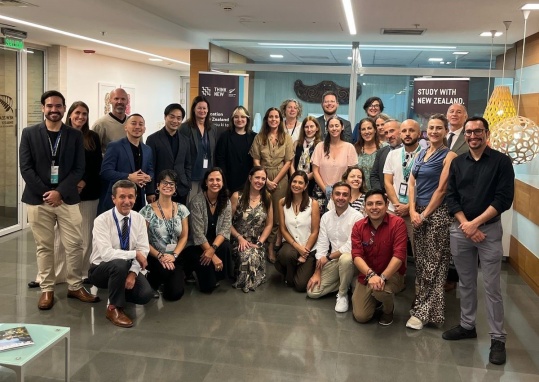
ENZ's Market Development Manager Bruna de Natale (pictured second from right, bottom row), Director of Engagement Latin America Javiera Visedo (pictured fifth from left, bottom row) and Coordinator Simone Cocco (pictured second from right, bottom row) with roadshow participants at one of the events in Santiago.
Director of Engagement Latin America, Javiera Visedo, said engagement between New Zealand institutions and the Latin America market advanced significantly during the roadshow.
“There is no substitute for the connections and momentum we build when we meet face-to-face, and the trusted relationships we build,” she said.
“Engagements like these are key to ensuring the sustainable growth of students from Chile, Colombia, and Brazil to New Zealand,” Javiera added.
Feedback from education sector participants was positive. Director of Mount Maunganui Language Centre, Geoff Butler, said he wouldn’t hesitate to get involved in these events again.
“Post-pandemic, we were keen to have official events to reconnect with these markets - the events didn’t disappoint,” he said.
“There were excellent opportunities throughout each event day to engage with agents not only at our desks, but informally too,” Geoff added.
If you’re a New Zealand education provider and are interested in learning more about the Latin America market, reach out to the team via email: latinamerica@enz.govt.nz.
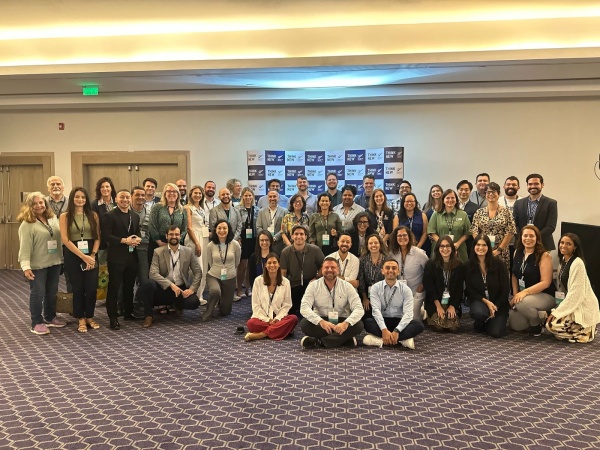
Attendees of the São Paulo ENZ agent event.
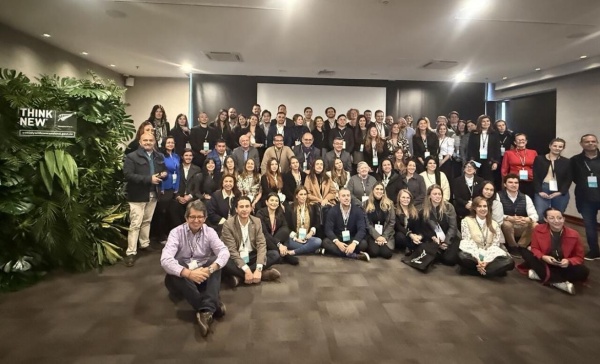
Attendees of the Bogotá ENZ agent event.
-
Positive outcomes for education from PM’s trade mission to India
Prime Minister Rt Hon Christopher Luxon led a high-level visit to India from 16–20 March, accompanied by one of the largest New Zealand delegations to date. The delegation included representatives from the business, community, media, and government sectors, along with a cultural delegation, Te Kapa Haka o Te Whānau-a-Apanui.
Education New Zealand Manapou ki te Ao (ENZ) Chief Executive Amanda Malu joined the trade mission as part of the education component of the delegation – alongside University of Auckland Vice Chancellor, Dawn Freshwater; Vice Chancellor, University of Waikato, Neil Quigley; Te Pūkenga/NZIST Chief Executive, Gus Gilmore and Whitecliffe College Executive Chairman, Feroz Ali.
The mission saw a number of key education initiatives announced that aim to strengthen New Zealand’s education ties with India, including the signing of the refreshed bilateral Education Cooperation Arrangement (ECA).
These initiatives mark a significant step forward in deepening New Zealand’s collaboration with India around joint research, student exchanges, academic innovation and fostering long-term institutional partnerships.
The original ECA was signed in 2010 with the objective of strengthening bilateral cooperation between New Zealand and India and fostering collaboration and the exchange of information on individual education systems.
The ECA refresh builds on this foundation and aims to foster further cooperation in education specifically through information exchange, collaboration between institutions, and sharing best practices in curriculum development, digital transformation, and sustainability.
A key education engagement during the mission was the ‘Shared Visions and Connected Futures’ event on 18 March, co-hosted by ENZ and New Zealand Centre partner IIT Delhi. Key education and government stakeholders were brought together to celebrate education, innovation, and the strong ties between New Zealand and India.
Six new memoranda of understanding (MOU) were signed on the day, with an additional four signed across other events and cities. The New Zealand Excellence Awards (NZEA) scholarships were officially launched by Prime Minister Luxon and ENZ Chief Executive Amanda Malu - this is a joint initiative between ENZ and all eight New Zealand universities offering a total of 29 scholarships valued at NZ $260,000.
An exclusive virtual internship programme was also launched – this initiative will provide opportunities for 30 IITD students to intern virtually with New Zealand organisations. The event also witnessed the announcement of the inaugural New Zealand Centre Innovation Fellowship which aims to enhance collaboration between New Zealand and India in innovation and entrepreneurship by providing a two-week immersive experience in India's innovation ecosystem.
The Prime Minister in a Fireside Chat with New Zealand alumni, Shirley Setia, University of Auckland alumni and Ashwani Batla, University of Waikato alumni.
To round off a packed programme, the Prime Minister hosted a "Fireside Chat” with celebrity alumni from University of Auckland and the University of Waikato, where they showcased their experiences studying and living in New Zealand.
ENZ Chief Executive Amanda Malu said the event was a testament to the strength of New Zealand’s educational relationship with India.
“India and New Zealand share a longstanding education relationship. Our collaborations bring enduring benefits to both nations. We look forward to continuing to work together to innovate, grow our skills and co-create education solutions for our future,” she said.
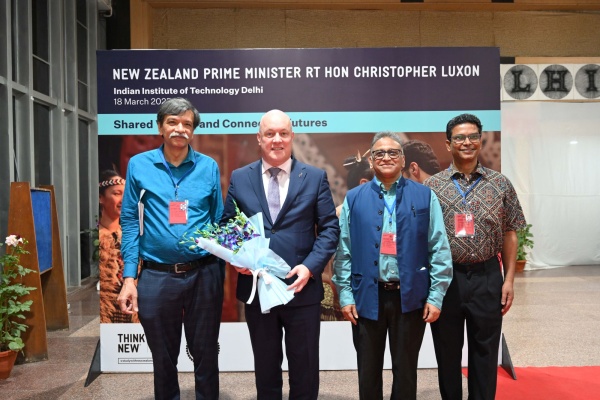
From L to R: Director of IIT Delhi, Professor Rangan Banerjee; the Prime Minister; Dean of Research and Development, Professor Naresh Bhatnagar; and Dean of International Programmes Professor James Gomes.
-
Brazilian champions Māori world view to design students globally
So transformative was the experience, that the former international student is determined that design leaders globally learn from AUT’s success embracing Māori knowledge in tertiary design studies.
Marcos came from Sao Paulo to study for his PhD in Design at AUT in 2015. He always felt that Aotearoa was “calling” him and was drawn to the concept of practice-led research, which allows students to be assessed by their creative work alongside a supportive piece of writing.
“This means that your practice is your contribution to knowledge,” he says. “I was fascinated by the idea.”
Practice-led research has been around for many years but is still not widely used. AUT, now considered a world-leader in its implementation, developed the approach under education “disruptor” Professor Welby Ings, who believes thinking outside the box can be the key to success for many learners.
Embracing the natural world from a Māori perspective
While Marcos enjoyed the early months focusing on his photography, it was an introduction to respected Māori scholars Professor Hinematau McNeill and Professor Robert Pouwhare late in his first year which really rocked his world.
“They shared their love and knowledge and introduced me to Māori views of the natural world. Their way of thinking and seeing the world completely resonated with me. I understood how ignorant I was in terms of expecting to be able to explain the world through a Western perspective. I learned from them that there is so much beyond it that we cannot see.”
“I learned how the world can be seen from an indigenous perspective, and I felt really bad that my own culture has more than 300 indigenous tribes and we never learn anything about them.”
He says he became really connected with Māori epistemology (theory of knowledge) and committed to understand and incorporate Māori elements in a substantial part of his thesis. “I try my best to captivate the complex Māori concept of mauri (life force or essence) in my work.”
Incorporating the Māori view of the natural world in practice-led research is attracting and retaining students who might not otherwise thrive in a university environment, Marcos says.
At AUT’s Manukau campus, the majority of students are Māori and Pasifika. “These students have natural storytelling talents, and they love graphic design, photography, street art, and all forms of contra-culture expression (outside mainstream media).
Māori and Pasifika students feel sense of belonging
“They feel a sense of belonging to the university with this approach. ”Last year saw the biggest increase in the number of students continuing from undergraduate to postgraduate study in Communication Design, using the practice-led approach.
Driven to promote this diversity of thought and boost the status of indigenous cultures and language elsewhere, Marcos is using his connections in Brazil to share Aotearoa’s success with South America and beyond.
A former colleague, Professor Sérgio Nesteriuk Gallo, is now head of a postgraduate programme in Art and Design at Anhembi Morumbi University (UAM) in Sao Paulo where students are increasingly using practice-led methodologies. “We agreed when I left for New Zealand that the knowledge I gained in practice-led research we would share and promote in Brazil,” Marcos says.
“We promised we would create an event every year to build a body of knowledge about practice-led research into the future. I know that many people, especially those from an indigenous background in Latin America are keen to take up this form of research.”
The first symposium was held in 2016 and attracted 10 exhibitors. Last year’s online symposium drew in 400 submissions from 13 universities around the world.
Planning is underway to take 10 of the most influential Māori practice-led researchers to Brazil for this year’s conference in December, called LINK2022 Moana Crossing, where they will run a series of workshops and launch a special edition of the journal incorporating original manuscripts from the Māori scholars and from collaborative partnerships with non-Māori practitioners.
Aotearoa New Zealand leading the way
“We have at least half the leading scholars in this field,” Marcos says. “Sharing this knowledge will hopefully influence the approach of those who teach elsewhere in the world.”
The new model of undertaking research and presenting knowledge must be more considerate of alternative approaches. “Māori traditions can enhance our understanding of research, practice, and the intricate connection with te taiao (the environment).”
He says he is committed to elevating the practice-led approach connected to Māori and first-nation knowledge, “taking our thinking to the world and giving a voice to indigenous cultures elsewhere”.
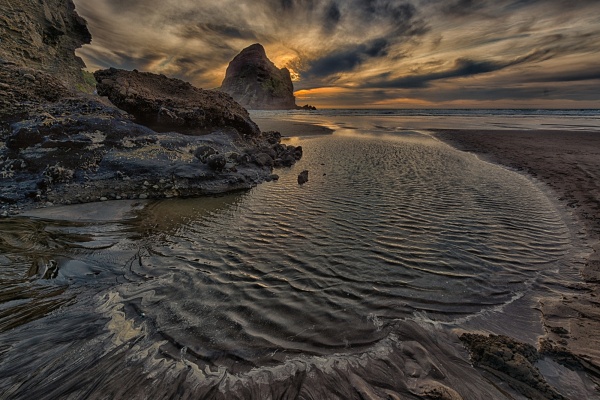
Piha at Sunset by Marcos Steagall.
-
Homestay host grateful for her international student whānau
Over a six-year period, Anne hosted 20 homestay students from all corners of the world and says she has remained in contact with a number of them.
Anne started hosting students when her son Jonas was just a baby. Now seven, Jonas has picked up the basics of Mandarin, Japanese, and Portuguese, and is relaxed with new arrivals in his life.
“He’s great at welcoming people and he’s very interested in languages. He might even go on to study language when he’s older,” she says.
Instead of a life which could, at times, have felt isolating as a mum bringing up a child on her own, Anne says her house was always a busy place. She loved the involvement the students had in her son’s life and the excitement they shared in his achievements and milestones.
“It was really an amazing experience for all of us.”
Rewarding to share cultural experiences
“There were times we shared the cooking, and some of the students taught me how to prepare meals they enjoyed in their culture.
Anne says she would show the students around Auckland, often taking them for day trips to Piha and sometimes to her father’s place in Whitianga for a classic Kiwi BBQ.
“It was important to me to show them New Zealand and our culture. They joined in family events and felt a sense of belonging.”
Anne has hosted students from China, Japan, Korea, Vietnam, Taiwan, Brazil, Saudi Arabia, and Germany, and experienced the many surprising ways in which they were enriched by each other’s cultures.

“I remember sitting on the beach with King, who was from China. He asked why people were smiling at him. I said that in New Zealand we tend to smile at each other and chat to people we don’t necessarily know. He said that didn’t happen in China and it was something he really enjoyed about New Zealand.”
Homestay experience broadened horizons
Now able to afford her own home, Anne says her experience as a homestay host opened her mind to accepting flatmates from a range of nationalities.
“We love having the mix of cultures in the house. I don’t think this would have happened if we hadn’t had the homestay students. I just feel grateful to have hosted them and think of them as extended whānau.”
-
New Zealand education brand updated for greater global impact
ENZ developed an updated look for the New Zealand education brand, guided by research to assess the recognition and effectiveness of our brand elements.
The insights from this research have guided the development of an updated look that reflects the evolving story of New Zealand education and the values it represents on the world stage.
New logo for New Zealand education
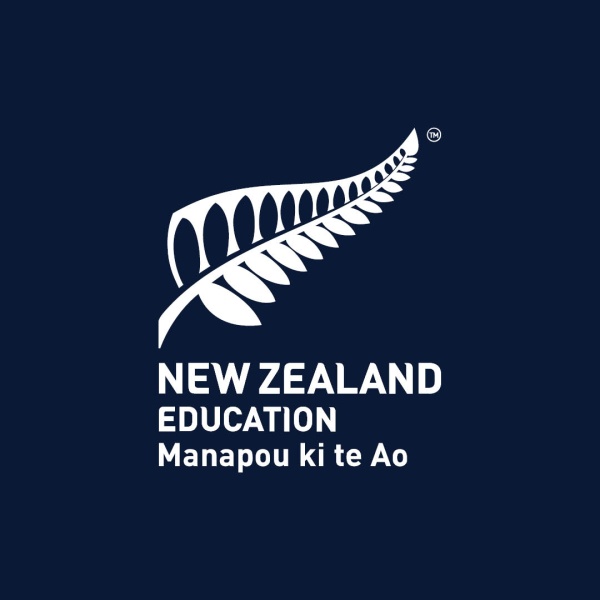
ENZ’s research identified the FernMark as a highly distinctive and recognisable symbol, strongly associated with New Zealand by global audiences.
See the new brand in action
ENZ Brand Lead, Nick Sinclair, said this brand uplift is more than just a visual update.
“This is a strategic step forward for us, with the intention to align ENZ’s brand with the quality, ambition and impact of New Zealand’s international education offering.
“We want to build confidence amongst prospective students and their families with a brand that is trustworthy and unmistakably New Zealand,” Nick added.
What’s happening next
-
New visual identity: You’ll start to see updated branding across the Study with New Zealand digital and social media channels over the coming weeks.
-
Refreshed brand and marketing assets: We’re refreshing key marketing collateral and event assets to reflect the new look. These include resources you can use in the outreach and promotional activity for your education institution.
-
Videos and content: Several core videos and promotional materials have already been updated with new branding.
New brand collateral will be available for download on our BrandLab by the end of July this year.
-
-
Auckland schools build relationships with education agents and schools in Japan
For the first time, a group of 16 Auckland-based high schools collectively visited Japan.
Their aim? Engaging with education agents and local schools to explore building long-term relationships, develop student exchanges and promote study at primary and secondary schools in Auckland.
ENZ supported the delegation by hosting an event at the New Zealand Embassy in Tokyo for the school’s delegation to make local connections. Over 50 local education agents, schools and the New Zealand delegation were brought together to connect, share and learn from each other.

Representatives from Massey Highschool and Waiuku College speaking to education agents at the New Zealand Embassy event.
Mount Roskill Grammar School International Director, Wendy Reid, said the visit showed what regions can achieve with a joined-up approach.
“It was a privilege to work with so many professional and knowledgeable Auckland schools, and continue to build relationships with our Japanese partners,” Wendy said.
Feedback from partners in Japan was also positive. Ritsumeikan Uji Junior and Senior High School English Head of Department, John Headon, said the regional approach to this engagement showcased New Zealand’s strength in community spirit.
“No matter which school you visit, there’s a strong sense of reassurance that the entire region will come together to support their students,” he said.
The participating schools were Auckland Grammar, Botany Downs Secondary College, Gulf Harbour School, Howick College, Maraetai Beach School, Massey High School, Mount Albert Grammar, Mount Roskill Grammar School, One Tree Hill College, Rosehill College, Sacred Heart College, St Mary’s College, St Peter’s College, Takapuna Grammar, Waitākere College and Waiuku College.
While in Japan, the Auckland school group maximised the opportunity by independently visiting other key regions, visiting partners and meeting with prospective families.
Since their return, the group of schools has been busy following up with the new and existing partnerships.
-
New Zealand-trained astrophysicist receives top honour in Malaysia
She was awarded the prestigious Commander of the Order of Loyalty to the Crown of Malaysia, by Sultan Abdullah at his annual Honours ceremony. It carries the title of Tan Sri, one of the highest federal titles, and is only held concurrently by 250 living recipients.
Dr Othman studied physics at the University of Otago in the 1970s and returned for post-graduate study in the 1980s, becoming the first woman to graduate from the university with a PhD in Astronomy and Astrophysics. She then went on to forge a remarkable career in the male-dominated space industry.
Colombo Plan Scholar
Dr Othman came to New Zealand on a Colombo Plan scholarship. The Plan, a forerunner to our modern development assistance programmes, aimed to promote economic and social development in Asia through education and training.
Having fallen in love with physics as a teenager in the 1960s, Dr Othman didn’t discover astronomy or astrophysics until she arrived in Dunedin to study for her PhD in 1974.
“There were very few books available at that time and there was not much interest here in Malaysia, but it was very different in New Zealand,” she says. “Neil Armstrong’s landing on the moon in 1969 was a very significant event, but I didn’t think at that time that I would have space as a career. Not in a million years.”
Studying in New Zealand opened a world of opportunity for the young, Muslim scholar. Not only did she make a career in the space industry, but she became a leading authority, being appointed the Director of the United Nations Office of Outer Space Affairs in 1999, and the founding director of Malaysia’s National Space Agency in 2002.
She acknowledges it has been challenging at times. “It’s been a hard road because I’ve had to start everything from scratch. There was no set path to get to where I am today.”
Working to promote science and technology
She says her role at the UN was less about science, and more about diplomacy and politics. “How to balance one country’s requirements against another’s. Bringing people to the table together, even if they don’t agree, to try and agree on how to proceed. The other aspect of the job was to see how we could use space to enhance the development of developing countries, especially in science and technology.”
It is mostly her work at home for which she has been recognised by the King. As Malaysia’s first astrophysicist, Dr Othman was instrumental in introducing astronomy and space sciences into school and university curricula, advised the Government on space matters, was the driving force behind the National Planetarium in Kuala Lumpur, initiated the country’s National Microsatellite Programme, and headed Mega Science 3.0, the ambitious project to transform Malaysia into leading global player in science and innovation by 2050.
Justice and fairness in New Zealand education
But it all started as an international student in New Zealand, a time Dr Othman remembers as being both liberating and rewarding. “I particularly loved the egalitarian environment of the university, and that reflected wider New Zealand society.”
“There will always be a role for New Zealand in supporting education internationally through its cultural perspective on science,” she says. “There is no hierarchy in New Zealand science – professors treat their students as equals and encourage them to challenge and ask questions. That approach has stayed with me through my career.
“New Zealand education also instils a deep sense of justice and fairness.” – Malaysia alumna and astrophysicist Dr Mazlan Othman.
-
Prime Minister unveils 2025 Tripartite Fund recipients at Fudan University
During his remarks at Fudan University, Prime Minister Christopher Luxon announced the 2025 New Zealand–China Tripartite Partnership Fund recipients, as well as plans for a second high-level Education Forum to be held during China Annual Conference and Expo for International Education (CACIE) 2025.
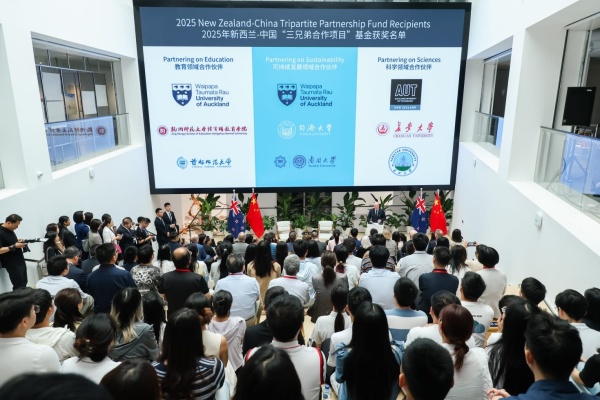
2025 marks 20 years of the New Zealand – China Tripartite Partnership Programme. Photo credit: New Zealand Trade & Enterprise.
ENZ congratulates the following researchers whose projects exemplify the high-quality research collaboration between our two countries:
-
Dr Fiona Ell (University of Auckland): Working with Hangzhou Normal University and Capital Normal University to enhance mathematics and science teacher education through comparative studies and exchanges.
-
Dr Sihong Wu (University of Auckland): Partnering with Tongji and Nankai Universities on sustainable production and carbon neutrality in manufacturing joint ventures.
-
Dr Yiming Ma (Auckland University of Technology): Collaborating with Chang’an and Yangtze Universities to explore mechanisms behind silent earthquakes.
Dr Fiona Ell said she is looking forward to working with her Chinese research partners to enhance mathematics and science teacher preparation, an important focus for education systems in both New Zealand and China.
“Our study brings together teacher educators from two Chinese universities, and teacher educators at the University of Auckland to exchange ideas and techniques for mathematics and science teacher preparation. The Tripartite grant allows us to visit each other, see teacher education practices in each country and compare policy directions in teacher education,” she said.
This will enhance the understanding and skills of all participants and help us find ways to improve mathematics and science teacher education in both countries,” Dr Ell added.
The Tripartite Fund, managed by ENZ in collaboration with several government agencies, supports strategic research partnerships between one New Zealand and two Chinese universities. The programme celebrates its 20th anniversary in 2025.
Learn more about the Tripartite Partnership Fund here.

Professor Nic Smith, Vice-Chancellor Te Herenga Waka – Victoria University of Wellington exchanges a Memorandum of Understanding with Fudan University President, Li JIN. Photo credit: New Zealand Trade & Enterprise.
Another key part of the event was Victoria University of Wellington renewed an agreement with Fudan University to revitalise the relationship, achieve resumption of student flows, and pursue research cooperation in the areas of public health, bio-tech and climate science.
-
-
Support for Prime Minister’s Scholarships for Asia and Latin America recipients to continue to June 2026
The Prime Minister’s Scholarships programme was discontinued, and its funding reprioritised in the latest Government Budget 2025.
The decision to discontinue the programme is in line with the Government’s priority to deliver effective and fiscally sustainable public services and the need to focus on core activities in the current constrained fiscal environment.
The change takes effect from 1 July 2025. The decision will not impact any of the scholarships’ current recipients or recipients of the final group round, who were confirmed in June.
ENZ will continue to support current recipients, including those who are yet to travel overseas to 30 June 2026.
Since their inception in 2013 and 2016, respectively, the Prime Minister’s Scholarships for Asia and Latin America have been among ENZ’s significant, transformative and impactful programmes of work. To date, the programme has awarded 3,991 scholarships that have helped New Zealanders not only deepen their understanding of different cultures and languages but also enrich appreciation for their own culture and place in the world.
ENZ’s Group General Manager, International Marketing, Brand and Scholarships, Anna Gestro, said the Prime Minister’s Scholarships for Asia and Latin America have had a truly positive impact for building New Zealand’s connections in two key global regions.
“To date, the programme has awarded 3,991 scholarships that have helped New Zealanders deepen their understanding of new cultures and languages and enriched appreciation for their own culture and place in the world.
“The programme leaves a rich legacy through its rich and diverse alumni, who will continue to be global citizens in the way they nourish the connections and learnings picked up from their life-changing experiences from the scholarships,” Anna said.

